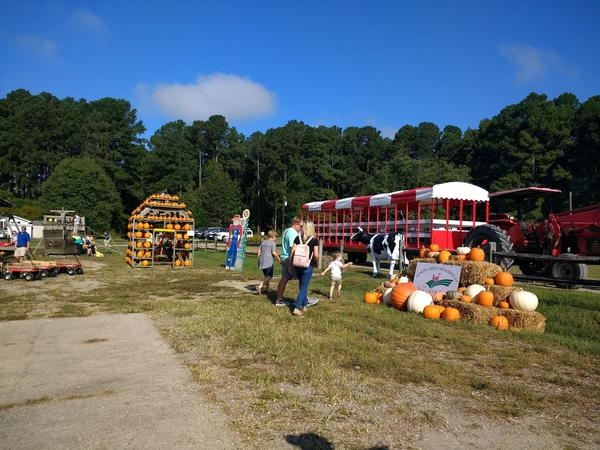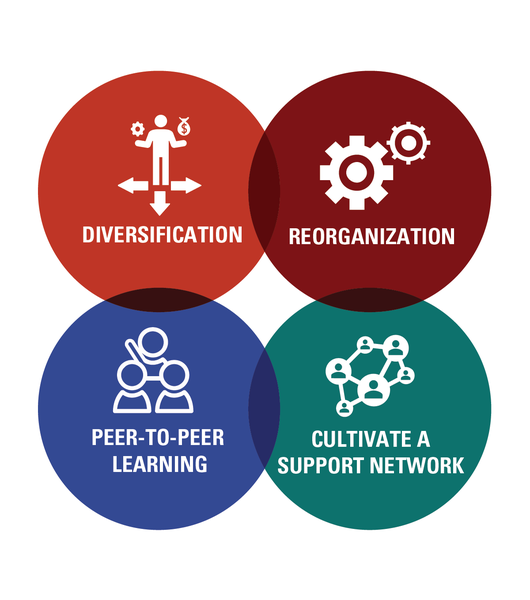Introduction
When the World Health Organization declared the coronavirus COVID-19 outbreak a global pandemic in March 2020, authorities worldwide implemented measures to curb the spread of the virus, imposing lockdowns and travel restrictions as well as limiting mass gatherings. In North Carolina (NC), the Executive Stay-at-Home Order No. 121 and the ensuing social distancing measures caused unprecedented challenges to the economy and to the safe operation of businesses across the state. Like many businesses, agritourism operations in North Carolina were directly impacted. Nonetheless, they also exhibited resilience in that uncertain and quickly changing context.
This publication documents the lessons learned by agritourism operators whose businesses were impacted by the COVID-19 crisis in North Carolina. Agritourism generates revenue for family farms through on-farm markets and ticket sales to their recreational offerings (Tew and Barbieri 2012), and it is a source of employment for rural communities (Barbieri 2013). Understanding the practices employed by agritourism operators in response to the COVID-19 health crisis offers valuable insights for improving the agritourism industry’s resilience when facing a major health crisis.
About This Study
Six agritourism operators shared their stories with us through a series of three interviews each. The participating operators offer hands-on agritourism activities with a variety of U-pick crops such as strawberries, blueberries, pumpkins, and apples. The farms are located near urban areas across the three NC regions and range from 100 to 1700 acres in size. We asked each agritourism operator about the practices they implemented to cope with the COVID-19 crisis. From 18 total interviews, we identified the major themes that outline how agritourism operations maximized their resilience during the COVID-19 pandemic.
What Did We Learn?
The agritourism industry endured considerable economic losses when the stay-at-home order kept farms from hosting visitors and school field trips. Even when preventive measures relaxed, limitations on mass gatherings threatened farms’ capacity to serve visitors in numbers that would financially justify opening to the public. Yet, some agritourism operators were able to pivot their offerings to comply with the state and local safety guidelines to protect their staff and farm visitors from infection. From these operators, we share valuable lessons that can be leveraged by agritourism businesses to improve their resilience.
Lesson 1: Diversify Your Income Sources
Even during typical operating times, agritourism operations are notable for diversifying their income as their business model combines both agricultural and tourism activities. We found that this existing operational organization was essential for leveraging and expanding on during the COVID-19 crisis to promote resilience.
“The key right now is being diversified, not having all the eggs in one basket.”
Farmer 1
When farmers were not allowed to host visitors during spring 2020, the farms’ agricultural production and their on-farm markets remained operational. Farmers noted that selling agricultural products helped their operations withstand the initial shutdown:
“We do the agritourism in the fall, and on normal years I would say the agritourism business probably saved our produce business the majority of the time. This year it looks like it's going to be the other way around. It looks like the produce business may save the agritourism business. …” Farmer 5
In contrast, Farmer 6 did not have an on-farm market and the agricultural production is limited to contract farming. When asked whether they had been able to generate income during the shutdown, Farmer 6 replied: “No, we did not because we did not grow any produce or strawberries or anything. So, we did not have crops that were coming out.”
Lesson 2: Be Open to Reorganizing Your Business to Adapt to the Changing Context
While agritourism farms may be used to running their businesses in a particular way, it is crucial for farmers to be open to reorganizing their operations. An example of reorganization is changing the operation’s layout to allow for social distancing. In the interviews, agritourism operators indicated that they had reorganized their processes to abide by the preventive measures put in place by NC Governor Roy Cooper. Farmer 2 said that setting up the online store to sell agricultural products directly to consumers was the most useful measure for overcoming the COVID-19 crisis: “Probably the single, biggest factor, I think helped us cope with the crisis financially, was being able to do our online store. Selling things that way and doing curbside.”
Additionally, Farmer 2 quickly identified the needs of the public and reorganized the market outlet to increase the variety of products offered at the on-farm store:
“In March, we realized that things like grocery stores, they were not having a lot of produce, no milk, no meat. … We were able to order more milk. We added meat, produce. We put that on the store and a lot of people felt comfortable coming here.”
Farmer 7 indicated that they ensured that they abided by the mass gathering limit by switching to online ticketing to reduce and control the number of visitors per tour:
“We have gone to online ticketing ahead of coming. … We have limited the size of our tours. Our preferred limit before was 15. If we had a bunch of people show up all at once, we might go to 20 before. We're at 10 now.”
Several of the other farmers also implemented an online ticketing process. This reorganization strategy not only helped in complying with state gathering restrictions but also allowed operators to improve their service in a variety of ways. Multiple farmers indicated that it helped reduce long lines, which had previously frustrated customers. When asked whether they will maintain online ticketing once the COVID-19 pandemic is not a threat anymore, Farmer 4 said:
“Absolutely, we would never go back to what we were doing before. It’s more convenient; it’s just better because we know how much staff to have in place, we know how much food we need to purchase to keep the concession stand stocked, it’s just better planning. …”
Additionally, Farmer 4 revealed other advantages inherent in online ticketing, such as offering visitors the opportunity to reschedule their tour if the weather was inadequate: “We had some rainy Sundays in October, some people are not accustomed [to], so we informed all visitors for that day about the weather conditions and allowed them to reschedule their ticket.”
Lesson 3: Connect and Learn from Your Peers
Farmers communicating with other farmers across the state emerged as an important factor in the resilience of agritourism operations in North Carolina. Through our research, we identified that agritourism operators connected with their peers through the North Carolina Agritourism Networking Association (NC-ANA). This organization is a long-standing resource for agritourism operators in the state, enabling peer-to-peer learning as noted by Farmer 2. Through the NC-ANA “we have done webinars, we have done Zoom calls where we all get on the call and we just share our ideas together.”
“What other farmers are doing matters the most in terms of decision-making.”
Farmer 1
NC-ANA created opportunities for farmers to exchange ideas and learn about how operations that receive visitors during spring (U-pick strawberry season) operated safely. Farmer 1 said, “Strawberry growers paved the way to receiving visitors safely in their farms.” Similarly, Farmer 3 indicated: “[Meeting with NC-ANA was good] I think because it told us what other farms are doing and how they're handling certain situations.”
Lesson 4: Cultivate a Support Network
Agritourism operators relied on information from both the tourism and the agriculture sector to decide about how to proceed. Farmer 3 indicated: “We attended webinars with the Department of Ag, the Strawberry Growers Association for North Carolina helped a lot. Our local chamber, the Tourism Authority, and Business Development Authority have been sending out a lot of information.” Drawing on informational resources from multiple industries provided operators with diverse strategies for addressing the challenges brought on by the COVID-19 pandemic.
Building connections in these varied spaces provided access to valuable supplies that became scarce amid the COVID-19 crisis, as Farmer 2 indicated:
“One challenge we had earlier was getting hand sanitizer. … We were getting some distillery gallons of liquid hand sanitizer. … Another thing that we did receive from our local Extension office and also from the Agromedicine [Institute] in North Carolina, we got a lot of face masks, gloves, face shields. We did get some sanitizer and some disinfectant from them too.”
Conclusion
By remaining open to the public, agritourism farms contributed to the overall resilience of their communities. As a result of their ability to diversify their income, reorganize their businesses, learn from their peers, and cultivate support networks, agritourism operators sustained sources of employment for their community members, expanded access to food in their communities, and offered safe spaces for outdoor recreation for people near and far—a particularly critical service at a time when many felt isolated due to lockdowns and travel restrictions. While these lessons are directed toward agritourism operations specifically, we believe they also provide important insight that many businesses can embrace to be resilient in the face of a health crisis or a significant external disruption.
Overall, the agritourism industry is an example of building during a global health crisis. Although not all businesses are suitable to serve dual functions like agritourism operations are, exploring opportunities to diversify functions, offerings, and audiences opens opportunities to adapt to the changing context. Additionally, enhancing peer-to-peer learning opportunities and cultivating a robust network of support drawing from different industries contributes to overall resilience.
Glossary
Agritourism: visiting a working farm for recreation or education (Gil Arroyo et al. 2013).
Contract farming: agreement for the supply of agricultural products between farmers and processing or marketing firms (Eaton and Shepherd 2001).
On-farm market: markets managed by farm operators that sell agricultural products directly to consumers from a location on their farm property or adjacent to their farm (USDA, N.D.).
Resilience: the ability of a system to resist shocks while maintaining its essential functions (IPCC 2014).
References
Barbieri, C. (2013). "Assessing the Sustainability of Agritourism in the US: A Comparison between Agritourism and other Farm Entrepreneurial Ventures." Journal of Sustainable Tourism, 21(2), 252–270. https://doi.org/10.1080/09669582.2012.685174
Eaton, C., and A. W. Shepherd, (2001). Contract Farming: Partnerships for Growth (No. 145; Bulletin) Rome: Food and Agriculture Organization of the United Nations.
Gil Arroyo, C., C. Barbieri, and Rich S. Rozier. 2013. "Defining Agritourism: A Comparative Study of Stakeholders’ Perceptions in Missouri and North Carolina." Tourism Management, 37, 39–47. https://doi.org/10.1016/j.tourman.2012.12.007
IPCC (Intergovernmental Panel on Climate Change). 2014: Summary for Policymakers. In: Climate Change 2014: Impacts, Adaptation, and Vulnerability. Part A: Global and Sectoral Aspects. Contribution of Working Group II to the Fifth Assessment Report of the Intergovernmental Panel on Climate Change [Field, C.B., V.R. Barros, D.J. Dokken, K.J. Mach, M.D. Mastrandrea, T.E. Bilir, M. Chatterjee, K.L. Ebi, Y.O. Estrada, R.C. Genova, B. Girma, E.S. Kissel, A.N. Levy, S. MacCracken, P.R. Mastrandrea, and L.L. White (eds.)]. Cambridge University Press, Cambridge, United Kingdom and New York, NY, USA, pp. 1-32.
Tew, C., and C. Barbieri. 2012. "The Perceived Benefits of Agritourism: The Provider’s Perspective." Tourism Management, 33(1), 215–224. https://doi.org/10.1016/j.tourman.2011.02.005
USDA. (n.d.). Local Food Directories: On-Farm Market Directory. Retrieved March 15, 2021, from https://www.ams.usda.gov/local-food-directories/onfarm
Acknowledgments
We are very grateful to the farms that participated in this study. We also thank the reviewers of this publication, Elizabeth Driscoll and Stacy Macklin.
This study was funded by the Natural Hazards Center, University of Colorado Boulder.
Publication date: May 11, 2021
AG-901
N.C. Cooperative Extension prohibits discrimination and harassment regardless of age, color, disability, family and marital status, gender identity, national origin, political beliefs, race, religion, sex (including pregnancy), sexual orientation and veteran status.


